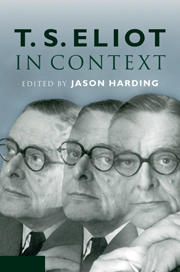Book contents
- Frontmatter
- Contents
- List of illustrations
- List of contributors
- Acknowledgements
- List of abbreviations
- Introduction
- PART ONE LIFE
- PART TWO FORMS
- PART THREE LITERARY CROSS-CURRENTS
- PART FOUR POLITICS, SOCIETY AND CULTURE
- PART FIVE RECEPTION
- 34 Contemporary reviews
- 35 Contemporary and post-war poetry
- 36 Eliot studies
- 37 Legacies: from literary criticism to literary theory
- Further reading
- Index
37 - Legacies: from literary criticism to literary theory
Published online by Cambridge University Press: 05 August 2012
- Frontmatter
- Contents
- List of illustrations
- List of contributors
- Acknowledgements
- List of abbreviations
- Introduction
- PART ONE LIFE
- PART TWO FORMS
- PART THREE LITERARY CROSS-CURRENTS
- PART FOUR POLITICS, SOCIETY AND CULTURE
- PART FIVE RECEPTION
- 34 Contemporary reviews
- 35 Contemporary and post-war poetry
- 36 Eliot studies
- 37 Legacies: from literary criticism to literary theory
- Further reading
- Index
Summary
To us he is no more a person
Now but a whole climate of opinion
(W. H. Auden, ‘In Memory of Sigmund Freud’)No doubt W. H. Auden did not intend any reference to T. S. Eliot's theory of impersonality in his famous poem ‘In Memory of Sigmund Freud’. But even in 1940, Eliot's distinction between the man who suffers and the mind that creates (the mind that created the mind, in Freud's case) was a linchpin of twentieth-century criticism: its influence had already reoriented criticism towards the poem and away from the poet and would stimulate W. K. Wimsatt's more philosophical exposition of ‘The Intentional Fallacy’ (1946). Soon after, Harold Bloom's ‘anxiety of influence’ more pugnaciously continued the textual conversation with the dead, though in a rivalrous and agonistic vein only hinted at in Eliot's understanding of tradition (and disavowing any influence of Eliot himself). Finally, in the post-structuralist intertextualities of the 1980s, the theory that had begun life on the tide of Eliot's early desire to secure a more communitarian ground for the practices of authorship than the disembodied and individualistic Romantic theory of inspiration, was now exposed, in the most paradoxical swerve of all, as the distal cause of the death of all authors. The question of authorship, of who or what produces poems, and of legacies, of who or what continues the conversation with them, would emerge as one of the major chords of modern literary theory, continuing to sound through feminist, New Historicist and cultural materialist discussion for the rest of the century.
- Type
- Chapter
- Information
- T. S. Eliot in Context , pp. 381 - 394Publisher: Cambridge University PressPrint publication year: 2011



